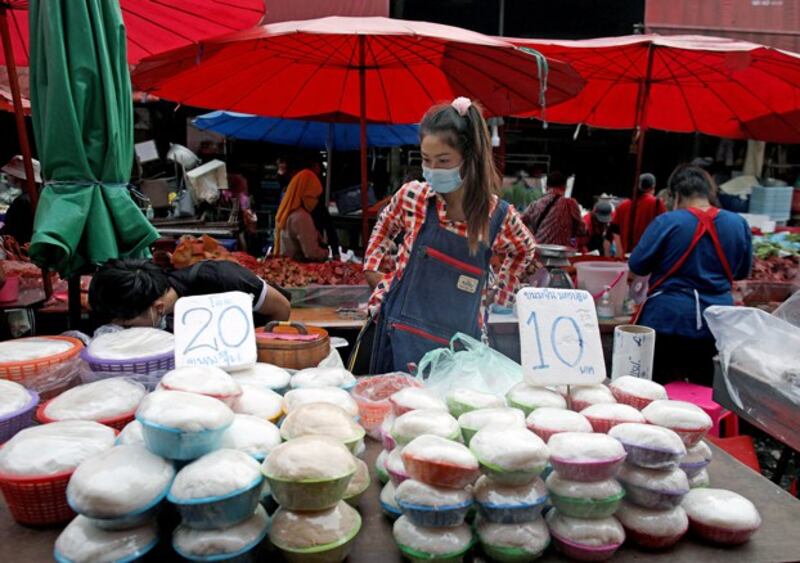Myanmar’s ruling junta has ordered all overseas workers to transmit 25% of their earnings back home via regime-approved local banks according to a mandated exchange rate.
The directive comes as the junta seeks alternative sources of foreign currency after many nations cut off foreign investment and international aid to Myanmar following the military’s 2021 coup.
The Labor Ministry’s order issued during the first week of September said workers must open a special account at CB Bank in Myanmar under the name of a family member, and can only transfer funds through the official banking system.
The junta said it would record documents confirming the official transfer of money from overseas workers, who will be entitled to tax-free benefits when purchasing goods for investment in Myanmar.
The military rulers also warned that those who did not comply with its directive would be banned from traveling abroad for three years.
Burmese migrant workers in Thailand, Singapore and other Asian nations said the measure was unfair and that the junta was trying to benefit from their income.
“They have run out of dollars due to the pressure of the revolution and the international community and the economic sanctions,” said Lin Lin, who has worked in Thailand for almost two years. “Since the pressure effectively impacts the military, they have gradually lost ways to earn foreign currency.”
‘It’s like robbery’
Overseas Burmese also believe the junta will pressure them to pay taxes based on their salaries and income.
“This is not fair,” said Ma Phyu, who has worked in Singapore for more than a decade.
Because she pays taxes to the city-state’s government, Ma Phyu said she should not have to pay taxes to the Burmese regime. Citizens from countries that are members of the Association of Southeast Asian Nations, or ASEAN, are exempt from paying double taxes on their income.
“The SAC is trying to get taxes from us because they don’t have dollars anymore,” she said, using the acronym for the State Administration Council, the formal name of the governing junta. “What would I call it? It's like a robbery.”
The migrant worker said a junta-appointed ward administrator has already collected her salary and personal information from her family members in Myanmar.
When renewing passports at the Myanmar Embassy in Singapore, Burmese workers now have to fill in their salary information and employment positions.

Wai Gyi, a Burmese sailor who works for a South Korean company, said the junta’s fixed exchange rate means he has weaker buying power given higher commodity prices.
Though the current exchange rate is 3,500 kyats per U.S. dollar, he now receives only 2,940 kyats.
“Commodity prices are rising but our salaries are paid at a fixed rate,” he said. “Under the military, our situations have become worse.”
Myanmar’s shadow National Unity Government, or NUG, has objected to the junta’s order forcing migrant workers to transfer portions of their salary only through money transfer institutions it designates.
The NUG has pointed out that the directive is inconsistent with Myanmar’s 1999 Law Relating to Overseas Employment and says the junta is trying to blackmail migrant workers beyond it.
The shadow government said it would take legal action under Thai labor law if the junta enforces the measure because it violates workers’ rights, said Wai Lin Maung from the NUG’s overseas employment department.
Surging inflation
Remittances to Myanmar through official channels, including banks, totaled US$1.5 billion in the six months through this April, Nikkei Asia reported in July, quoting Burmese authorities.
With the declining value of the kyat and surging commodity prices in import-dependent Myanmar, junta authorities began arresting currency traders who deal in U.S. dollars in August and have cautioned those who sell cooking oil and rice — staple food items — not to increase prices.
In recent days, authorities have arrested a licensed foreign exchange businessman and a large-scale foreign currency trader in Yangon, according to another currency trader who told RFA that such measures would not stabilize the economy in the long term.
Because of this, some foreign currency traders have stopped doing business, and there are fewer dollar sellers in the market, he said.
The junta’s Bureau of Special Investigation also summoned and interrogated four businesspeople, including the president of the Myanmar Edible Oil Dealers’ Association, and told them not to raise prices.
Local businessmen said the junta’s pressure on them to keep commodity prices down is a short-term solution to the crisis, and that leaders have failed to try to understand the market economy.
The country’s top military leader, Senior Gen. Min Aung Hlaing, said that current high prices are a result of price-gouging by unscrupulous people.
To ensure domestic economic stability, the junta has established bodies to tackle spiraling inflation, such as the Union Committee for Stability of Commodity Price, the Central Committee on Ensuring the Smooth Flow of Trade and Goods and the Foreign Exchange Supervisory Committee.
Translated by Myo Min Aung for RFA Burmese. Edited by Roseanne Gerin and Malcolm Foster.
